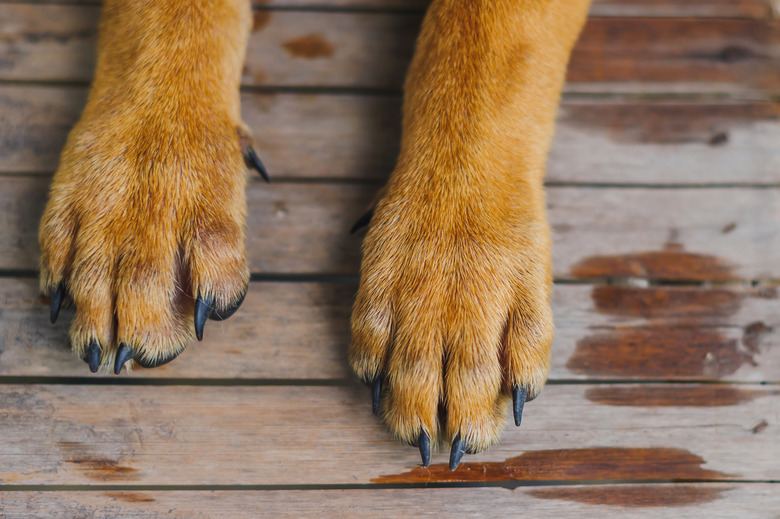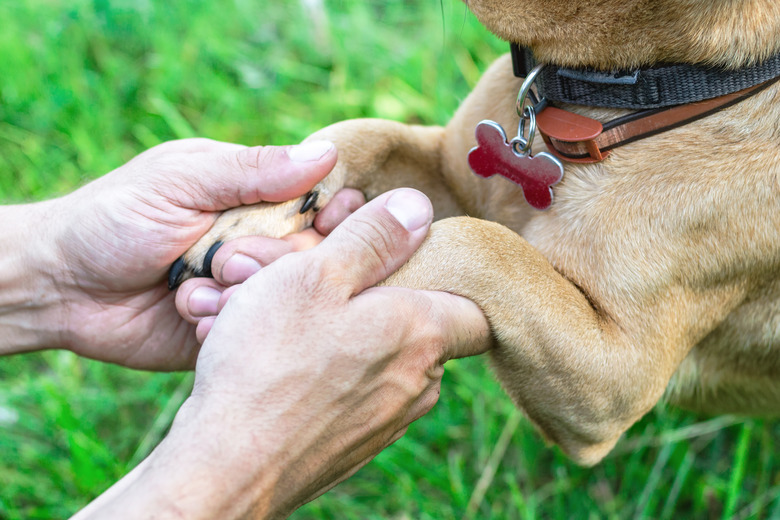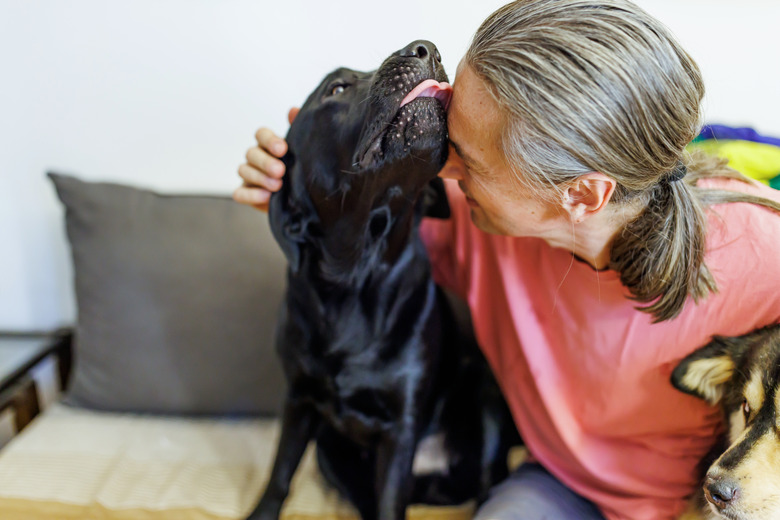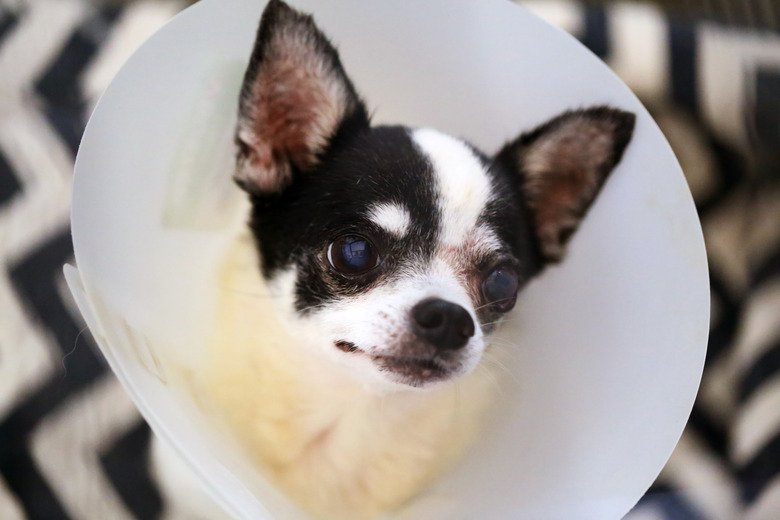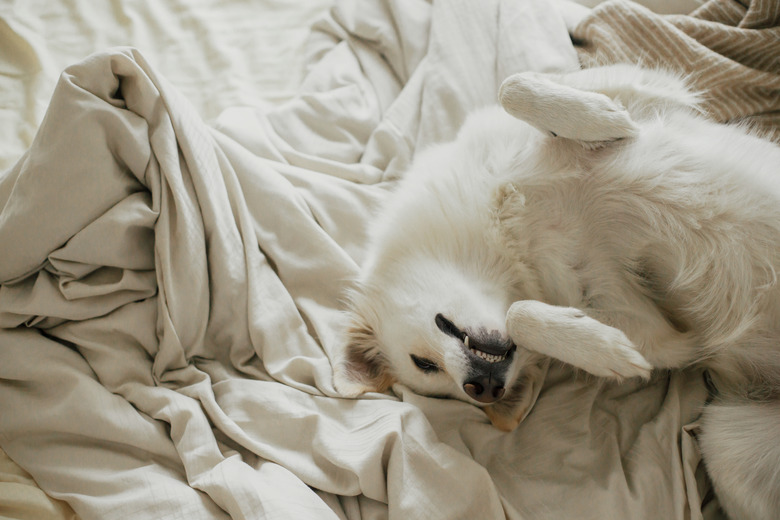How To Keep A Dog From Licking An Injured Paw
- Why do dogs lick their paws?
- Dog paw licking due to allergies
- Dog paw licking due to minor injuries
- Dog paw licking due to boredom or anxiety
- Identifying the cause of dog paw licking
- Dog collars that prevent paw licking
- How to stop dogs from excessive paw licking
- Do dogs lick their paws from dry skin?
- If a dog's paw gets irritated from too much paw licking
- The bottom line
Whenever dogs are injured, it's instinctive for them to lick the area that hurts. Dogs will lick a wound to soothe the pain, clean it of debris, or attempt to heal it. The latter actually makes some sense, as saliva contains small amounts of anti-bacterial compounds that can help guard against infection.
Unfortunately, the healing properties of dog saliva are largely overblown. While there does seem to be some anti-bacterial and anti-microbial properties in saliva, these beneficial properties are minimal. Worse yet, a dog who won't stop licking at a wound can lick to the point of making the skin raw.
Sometimes, a little licking is fine, but other times, this excessive self-grooming needs to be stopped because overlicking can cause more harm than good.
Why do dogs lick their paws?
There are many reasons dogs lick their paws. These include:
- Food allergies, flea allergies, or environmental allergies
- Minor cuts, scrapes, insect bites, or hot spots
- A bacterial infection or fungal infection
- A splinter or foreign object embedded in the paw pad or a cyst between the toes
- Burns from hot pavement
- Yeast infections
- Dry skin or other skin conditions
- Broken or cracked nails
- Boredom
- Behavioral issues due to anxiety, including separation anxiety or general stress
Dog paw licking due to allergies
One of the most common causes of excessive licking is itchiness due to allergies. If a dog engages in paw licking or paw chewing and no injury is visible, it may mean the dog has an allergy. Dogs may be having an allergic reaction to flea bites, something in their diet, or things they are exposed to in their environment, such as grass, mold, or dust mites.
Environmental allergies will usually present with itching around the face, ears, and feet. Atopic dermatitis is the clinical name for an inflammatory and chronic skin disease caused by environmental allergies. Avoiding exposure to known allergens and wiping the dog's paws after being outdoors may help to minimize the issue of itchy paws, but allergies of any kind should be seen by a veterinarian to identify the cause and ensure the proper treatment.
Dog paw licking due to minor injuries
Sometimes, dogs will lick their paws due to minor injuries, such as a splinter, thorn, small cut, burn from hot pavement, or broken nail. If the dog is limping or one of the dog's feet seems sensitive to the touch, it may be due to a minor injury. In the case of a splinter or thorn, removing it and thoroughly cleaning the paw may resolve the problem as long as there is no infection. Dogs should never be walked on hot pavement, but if their feet do get burned, seek veterinary care right away.
A partially broken nail may be trimmed down at home, but if a dewclaw is broken or a nail is badly cracked, this may require a visit to the veterinarian, as bacteria can get into a cracked nail, causing a painful infection.
If there is an open wound or if there is pus, a foul-smelling discharge, or excessive redness, an infection may be present. If this is the case, the dog will need to see a veterinarian, as infections can become serious very quickly.
Dog paw licking due to boredom or anxiety
It's common for dogs to lick between their toes, which may cause skin irritation that makes them want to lick even more. Sometimes, the cause can be boredom or a way to self-soothe out of anxiety.
While this may only happen occasionally, it can become a compulsive behavior that the dog has trouble stopping. In this case, the dog may benefit by seeing an animal behaviorist. If the problem is boredom, the dog may need more activity, such as dog training classes, exercise, or games to challenge the brain.
Identifying the cause of dog paw licking
The first step in stopping excessive paw licking is to identify the underlying cause. Some may be minor and easily treated, while others may indicate a health condition that must be treated by a veterinarian.
A partially broken nail may be able to be trimmed at home. Likewise, a simple splinter or thorn in a dog's paw may be easily removed. However, if there's an obvious wound, a cyst, or an infection, this will need to be treated by a veterinarian, as this may require antibiotics. In the case of a cyst, surgical removal may be needed. Likewise, allergies will require a trip to the veterinarian, as testing may need to be done to identify the cause of the allergies.
Sometimes, a dog begins licking when there's nothing physically wrong, but by licking continuously, the dog creates a wound or a tiny hot spot. If caught early, stopping the licking may stop the problem, but once there is an open wound, veterinary treatment is needed.
Dog collars that prevent paw licking
In the case of allergies, infections, or injuries that require stitches, it may take time for the medication to kick in and the healing to begin. In the meantime, it's important to keep the dog from continuing to lick or chew at the paw, as this can slow healing by reopening the wound.
One way to prevent a dog from licking their paw is to use an Elizabethan collar, also called a cone. This cone fits over the neck and extends out like a lampshade to prevent the dog's mouth from being able to reach the paw. Sometimes, a dog can still get to their paw with a cone on, in which case a larger cone may be needed.
There are also other types of collars that may be effective. Some collar alternatives are inflatable and are similar to a travel pillow for a human. It may also be necessary to keep the paw covered with a bootie, sock, or other covering.
Keeping a wound covered with a basic wrapped bandage may be enough to break the licking habit. However, check with a veterinarian first, as some wounds heal better when left uncovered. If a veterinarian bandages the paw, make sure the dog doesn't chew off the bandage or ingest pieces of it.
How to stop dogs from excessive paw licking
Stopping the licking can be tricky, and depending on the cause, it may require medication, coverings, distraction strategies, a change of diet, or even behavioral assistance.
- Distractions. It's worth trying some distraction techniques if a dog just won't stop licking. For instance, distracting the dog with a game of tug, a walk, or a puzzle toy with some food inside may be enough to stop the licking. Freezing some chicken or beef broth into an ice cube tray can provide a yummy distraction, giving the dog something more appealing to lick.
- Keep their feet covered. Socks or dog booties may provide a deterrent to paw licking. There are also bitter-flavored sprays designed to discourage chewing; lightly spraying the sock or bootie with one of these can make these even more effective. However, these products should not be sprayed directly on a wound, and any wound should be examined by a veterinarian.
- Food allergies. Prescription dog food or limited-ingredient dog food formulas may help stop the paw licking behavior if the cause is food allergies.
- Medication or behavioral training. If the paw licking is determined to be from anxiety rather than a health problem, prescription anti-anxiety medication or behavioral therapy may help.
Do dogs lick their paws from dry skin?
Just like people, some dogs suffer from dry skin, particularly in the winter. Dry, itchy skin can be uncomfortable for the dog, and if a dog's skin is itchy, they may lick at it to self-soothe.
If the veterinarian has ruled out allergies and other issues, dry, irritated skin may be addressed with a high-quality diet; bathing with a soothing oatmeal shampoo or veterinarian-approved medicated shampoo; dietary supplements, like fish oil or coconut oil; moisturizing wipes or sprays; or even a humidifier.
If a dog's paw gets irritated from too much paw licking
If a dog's paw gets irritated from too much licking, it may become red, raw, or infected. If the area is inflamed or looks infected, a visit to the veterinarian is in order. Antibiotics may be needed, or the veterinarian may prescribe anti-inflammatory or anti-fungal medicine or a topical treatment to soothe the skin.
The bottom line
Excessive paw licking may be a symptom of a greater problem, but even minor irritations can be exacerbated by constant licking. Whether the problem is allergies, infection, injury, or something else, a veterinarian can help identify the problem and set forth a treatment plan. While the paw is healing, licking should be discouraged. This can be done using an Elizabethan or inflatable collar, a paw covering, or anti-chew spray. A change of diet or distraction strategies may also help to keep a dog from excessive paw licking.
